I'm assuming the space at the end of the strings in the question was intentional so I left it in.
"Frank is one of the "top" students topicId{59220691223} "
6026d9b323898bcd7ecdbcbcd575b0a1d9dc22fd9e60074aefcbaade494a50ae
"Frank is one of the "best" students topicId{59220691223} "
6026d9b31ba780bb9973e7cfc8c9f74a35b54448d441a61cc9bf8db0fcae5280
It actually took about 7 billion tries to find one using brute force, a lot more than I expected.
I figure 2^32 is roughly 4.3 billion and so chance of not finding any match after 4.3 billion tries is about 36.78%

I actually found a match after about 7 billion tries, there was less than a 20% chance of no matches in 7 billion tries.

This is the C++ code I used running on 7 threads, each thread gets a different starting point and it quits once a match is found on any thread. Each thread also updates its progress to cout every 1 million attempts.
I've fast forwarded to where the match was found on threadId=5, so it takes less than a minute to run. But if you change the starting point you can look for other matches.
And I'm not sure either how one would use Floyd and Brent since the strings have to use the same topicId so you are locked in on both the prefix and suffix.
/*
To compile go get picosha2 header file from https://github.com/okdshin/PicoSHA2
Copy this code into same directory as picosha2.h file, save it as hash.cpp for example.
On Linux go to command line and cd to directory where these files are.
To compile it:
g++ -O2 -o hash hash.cpp -l pthread
And run it:
./hash
*/
#include <iostream>
#include <string>
#include <thread>
#include <mutex>
// I used picoSHA2 header only file for the hashing
// https://github.com/okdshin/PicoSHA2
#include "picosha2.h"
// return 1st 4 bytes (8 chars) of SHA256 hash
std::string hash8(const std::string& src_str) {
std::vector<unsigned char> hash(picosha2::k_digest_size);
picosha2::hash256(src_str.begin(), src_str.end(), hash.begin(), hash.end());
return picosha2::bytes_to_hex_string(hash.begin(), hash.begin() + 4);
}
bool done = false;
std::mutex mtxCout;
void work(unsigned long long threadId) {
std::string a = "Frank is one of the \"best\" students topicId{",
b = "Frank is one of the \"top\" students topicId{";
// Each thread gets a different starting point, I've fast forwarded to the part
// where I found the match so this won't take long to run if you try it, < 1 minute.
// If you want to run a while drop the last "+ 150000000ULL" term and it will run
// for about 1 billion total (150 million each thread, assuming 7 threads) take
// about 30 minutes on Linux.
// Collision occurred on threadId = 5, so if you change it to use less than 6 threads
// then your mileage may vary.
unsigned long long start = threadId * (11666666667ULL + 147000000ULL) + 150000000ULL;
unsigned long long x = start;
for (;;) {
// Not concerned with making the reading/updating "done" flag atomic, unlikely
// 2 collisions are found at once on separate threads, and writing to cout
// is guarded anyway.
if (done) return;
std::string xs = std::to_string(x++);
std::string hashA = hash8(a + xs + "} "), hashB = hash8(b + xs + "} ");
if (hashA == hashB) {
std::lock_guard<std::mutex> lock(mtxCout);
std::cout << "*** SOLVED ***" << std::endl;
std::cout << (x-1) << std::endl;
std::cout << "\"" << a << (x - 1) << "} \" = " << hashA << std::endl;
std::cout << "\"" << b << (x - 1) << "} \" = " << hashB << std::endl;
done = true;
return;
}
if (((x - start) % 1000000ULL) == 0) {
std::lock_guard<std::mutex> lock(mtxCout);
std::cout << "thread: " << threadId << " = " << (x-start)
<< " tries so far" << std::endl;
}
}
}
void runBruteForce() {
const int NUM_THREADS = 7;
std::thread threads[NUM_THREADS];
for (int i = 0; i < NUM_THREADS; i++) threads[i] = std::thread(work, i);
for (int i = 0; i < NUM_THREADS; i++) threads[i].join();
}
int main(int argc, char** argv) {
runBruteForce();
return 0;
}

